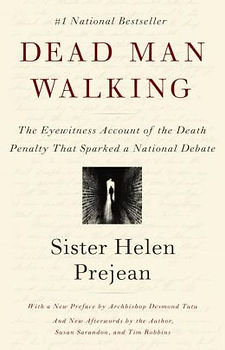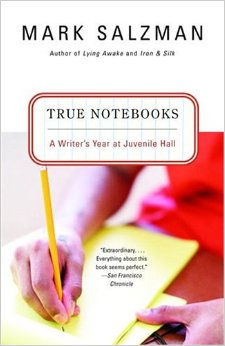Nonfiction

Dead Man Walking by Sister Helen Prejean
Published by Vintage Books in New York, 1993
Sister Helen Prejean brings a compassionate spirit to her writing in Dead Man Walking. Prejean presents the difficulty in reconciling the men she meets on death row with the horrible crimes they’ve committed. Her descriptions of Sonnier and Willie serve to humanize the men, a process which exists in complete opposition the death penalty, which dehumanizes them. Prejean’s dilemma in identifying how to comfort the victims’ families, work for justice for them, and work for justice for the death row inmates leaves her being pulled in different directions.
Prejean's writing demonstrates the disconnect in human relations caused by the practice of the death penalty. Prejean says that the question is not whether these convicts deserve to die, but rather, do we deserve to kill? To answer this question positively is to choose disconnect. To answer it negatively necessitates that we recognize the life of another, even one who commits evil, as connected to our own.
What would happen, Mr. Marsellus,” I ask, “if each time a condemned man appeared before you, the members of this board began recommending life, not death? What if you shared with the governor that you find the death penalty so morally troubling that you cannot bring yourself any longer to give your vote of approval to these executions? What would happen then, Mr. Marsellus?”

The New Jim Crow: Mass Incarceration in the Age of Colorblindness by Michelle Alexander
Published by The New Press in New York, 2013
Michelle Alexander provides a riveting account of how mass incarceration has resulted in the perpetuation of racial discrimation in the United States, resulting in a sort of "new Jim Crow" system. Although we only read a portion of Alexander's publication, the statistics she shared were both alarming and eye-opening.
Alexander's analysis of the war on drugs initiated under the Reagan Administration paints a picture of a program and a nation that systematically have disenfranchised the minority population from gaining any far-reaching equality in our country. By having policies that focus law enforcement efforts on historically black and lower-income areas, the young black population is perpetually set up to find themselves as suspects of criminal activity.
The disparity in racial populations in the United States vs in our prison system is a clear demonstration of the disconnect between our nation's preaching of equality and the goals of the Civil Rights movement.

Numerous paths were available to us, as a nation, in the wake of the crack crisis, yet for reasons traceable largely to racial politics and fear mongering we chose war on an ‘enemy’ that had been racially defined years before. . . . These stark racial disparities [in who has been imprisoned in the drug war] cannot be explained by rates of drug crime. Studies show that people of all colors use and sell illegal drugs at remarkably similar rates. If there are significant differences in the surveys to be found, they frequently suggest that whites, particularly white youth, are more likely to engage in drug crime than people of color. . . . From the outset, the drug war could have been waged primarily in overwhelmingly white suburbs or on college campuses...All of this could have happened as a matter of routine in white communities, but it did not. Instead, when police go looking for drugs, they look in the ‘hood.
True Notebooks: A Writer's Year at Juvenile Hall by Mark Salzman
Published by Vintage Books in New York, 2003
Salzman's writing recounts the time he spent teaching a writing class to juvenile offenders in California. Through his interactions with various juvenile offenders and guards, learning their stories, reading their writing, Salzman finds himself forging connections with a group of kids he is originally scared of.
Salzman originally agrees to teach the writing class as a favor to his friend, but ends up teaching at the juvenile hall for an extended period of time. During that time, he sees many of his students come and go - sometimes to a real prison, and very rarely released. He witnesses the boys' tragedies of lost appeals, the celebration of court victories, and their great joy from the small freedom of being able to write.
This account is relevant to our class because it humanizes the juvenile offenders, shows the conditions they live in, and reminds us that kids, even those who commit crimes, are still kids.
When I entered the library, Francisco greeted me by thumping his chest with his fist, then extended it toward em so we could knock knuckles. "That was tight the other day, Mark! You were the bomb."
Patrick nodded. "Everybody was saying you were even better than Miss California."
"Miss California was here?"
"Oh yeah," Patrick said, feigning casualness. "She was cool and all, but kinda superficial."
Nathaniel laughed. "You're just sore 'cause you didn't get to touch her ass."
"No, but I did get to touch the singer's ass. I was helping with the equipment and I made like I was moving the microphone and I managed to brush against it."
"What'd it feel like, homes?"
"Kinda bony. I was disappointed, to be honest."
"Never mind about her bony ass, we're talkin' about Mark here. You were funny."